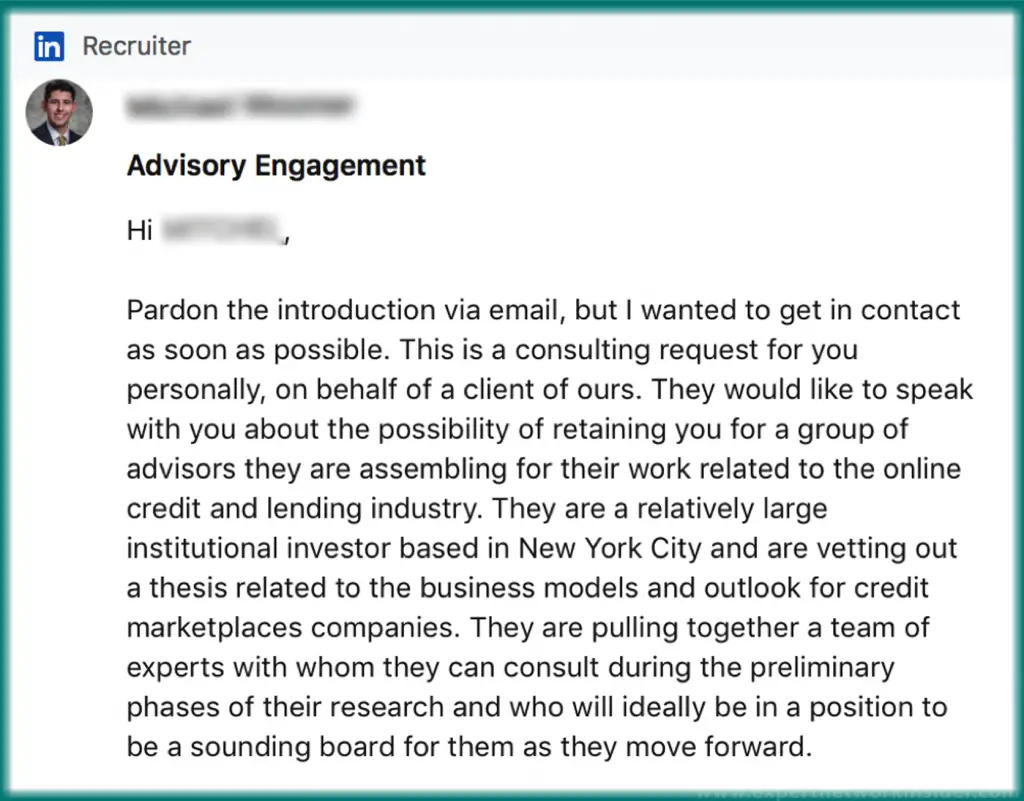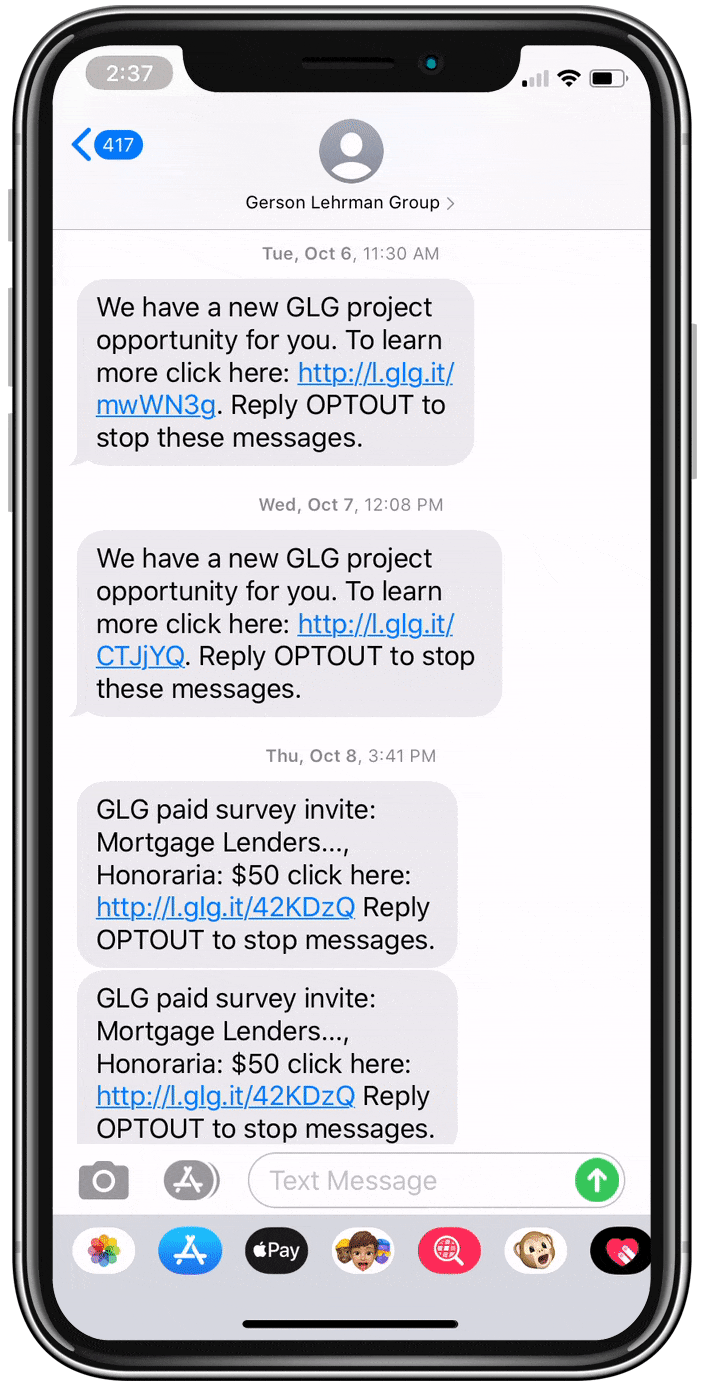Though expert network consulting opportunities tend to come in waves, I’ve consistently earned a healthy 5-figure sum from calls and surveys over each of the past six years – I can’t imagine that there’s an easier or more lucrative side hustle out there. Turns out that you don’t need to be a Fortune 500 CEO to land these opportunities by the bucket load!
I’m happy to share the strategies that I use to regularly land high paying calls from the top expert networks:
First, Get Found
When investors and consultants turn to expert networks to do a deep dive into a topic, they usually want to get a bunch of different perspectives, which includes opinions from current and former employees, customers, and competitors. Three quarters of the projects I’ve done tend to revolve around a specific company, with the rest being broader overviews of a market or niche.
Thus, when an expert network goes hunting for people to speak with their clients, it tends to be very keyword driven. If the client wants to speak to former salespeople who worked for XYZ company, they are going to immediately reach out to you if your LinkedIn or expert network profile says “salesperson at XYZ company”.
Pretty straightforward, right?

So think about ALL of the companies that you know fairly well and have interacted with meaningfully over the past year or two and make sure you specifically call them out, too. Your current and former employers are obvious. But what about your competitors? If you spend a lot of time explaining to customers why your product is better than the other guy’s, you’re probably an ‘expert’ on that company, too – at least as far as an investor looking to get a broad variety of insights is concerned!
And don’t forget all of the products and services that you use in your work. Say there’s a certain piece of software that you use regularly at work. If you can articulate what you like and don’t like about it and if you anticipate using it for years to come or feel that it’s terrible and can’t wait to replace it with a new product that’s rapidly gaining traction, then you could be an expert in that as well. Did you recently go through a big evaluation process to select a new vendor? You’re probably qualified to speak about that whole product category, including valuable perspective on the companies that you didn’t choose to go with!
Make sure you list and regularly update all of these companies and experiences on both your LinkedIn profile and all of your expert network profiles. It can (and should) be as straightforward as something like, “I am a customer and regular user of Product A, Product B, and Product C. I recently led my company’s search for a new widget provider, where I evaluated Company X, Company Y and Company Z; I recently signed a new $100,000 contract to buy Company Z’s widgets.” When I changed all of my profiles to this format, it probably tripled the volume of opportunities that started coming my way!
I want to offer one more important note on listing companies on your profile. If you’ve had some success with expert networks, you’ve probably done multiple calls on the same topic or company. Companies or niches that are attracting a lot of investor attention – often because they are about to announce an IPO, acquisition or key earnings release – quickly generate a large need for experts at multiple networks, so it pays to be in the right place at the right time. If you can provide good insights on a hot company, make sure you clearly detail that front and center on your profiles.
Ok, now that your email is filling up with new opportunities, it’s time to focus on the next step:
Landing the Call
Getting contacted about a bunch of consulting calls is great, but unless you land the assignment they’re not going to help pay for that weekend away. It doesn’t take much effort to differentiate yourself from the competition and land 50% or more of the relevant expert network opportunities that come your way.
Start by taking a step back and thinking about the two people you need to convince to hire you at sky-high rates for an hour of your time. There’s the paying client at an investment or management consulting firm, and there’s the beleaguered associate at the expert network.
It’s pretty easy to make them both happy. Be responsive, be descriptive and be available.
When an expert network associate kicks off a search for experts for a new project, they shotgun out dozens of emails, texts and calls at a time. Responding as quickly as possible gets you to the front of the line so there are lower odds of a project filling up before you are even considered. It also signals to the associate that you will be responsive and make their lives easy for any follow up questions and scheduling.
When answering screening questions, invest a few a minutes in writing complete, detailed sentences. Again, provide the company/product names and keywords that you think they are looking for. Never provide yes/no answers to questions about your experiences.
For example, a common screening question will be along the lines of, “Do you have experience buying XYZ products for your company?”
A strong, yet simple answer is, “Yes, I directly manage the $5 million budget for XYZ products at my company. I have been a customer of Company A three years and Company B for six months, plus I recently met several times with Company C to evaluate their offerings.”
Now, if the expert network or their client are trying to decide between two candidates for a call, are they more likely to pick the person who provides those kinds of details and specifics or the one who simply replied “Yes”?
As I often get very similar screening questions time after time, I’ve created a document where I’ve pasted every answer that I’ve given. This makes it really easy to provide quality responses to screening questionnaires in just a couple of minutes.
Finally, now that you’ve made them want to speak with you, make it really easy for them to schedule with you. Provide your availability for the next seven days with your response and try to provide the largest blocks of time as you can; don’t forget about before and after your normal working hours if that’s feasible for you. Making it convenient to schedule a call with you will absolutely help you to land more of them.
With your call all set, it’s time for the final step:
Make them Love You
Like any service, if you establish a reputation as a top provider, you’ll always have a steady stream of people looking to do business with you. Expert networks are no exception, and associates tend to turn to well-regarded experts first when they have a project to fill.

One of the simplest, but most important traits of a good expert is to be reliable and punctual. I’ve heard from a quite a few associates that I work with that there are few things they hate more than experts who reschedule at the last minute or don’t show up for a call. It’s embarrassing for them and adds to their workload. It can take just one missed call or client complaint for them to blacklist you from their entire network.
So find a quiet place, make sure you have a good headset and connection and show up on time. I also always try to block out some extra time, in case calls run long. Services like GLG that pay by the minute will keep paying for calls that extend past the allotted time, so it’s always nice to be able to pick up a few extra bucks if the client wants to talk beyond the 60 minute mark.
Finally, I do like to go against the conventional wisdom that you don’t need to prepare for these calls.
As calls tend to mostly revolve around the same few companies, I like to jot down a quick framework of everything I want to cover with the client so I can lead the call in a comprehensive and authoritative way. I want to make sure that I deliver a few key nuggets, examples and rules of thumb, as those tend be the deeper insights that clients are so eager to get at. During the call, I also like to check in a few times to make sure that I’m giving them the type of information that they’re looking for
Ahead of a call, I also like to spend a few minutes checking to see there are any recent news about a company that I may unaware of, so I don’t lose credibility if I’m unaware of a major news story that just broke. If a company just put out a financial report, I’ll give it at least a good skim so that I know the key numbers and any new strategic developments. It helps me provide sharper insights on calls, plus I often pick up useful tidbits for my day job as well.
I believe that some expert networks have formal rating or ranking systems that help determine the types and volume of project opportunities you get access too, and perhaps even the rate they are willing to pay you. They certainly all make note of both good and bad client feedback about you. So put in just a little bit of extra effort to stand out and you’ll often be rewarded.
- Dialectica Review – High Paying Expert Network - February 9, 2024
- The Ultimate Guide to Expert Network Consulting - February 8, 2024
- AlphaSights Review – Can You Really Earn $500+ an Hour? - February 5, 2024

